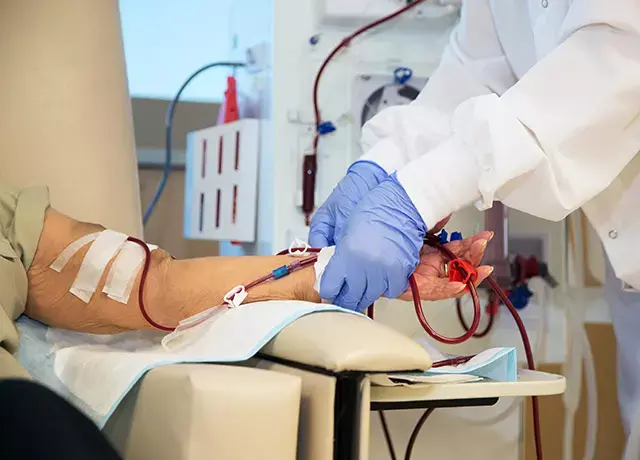- Home
- Medical news & Guidelines
- Anesthesiology
- Cardiology and CTVS
- Critical Care
- Dentistry
- Dermatology
- Diabetes and Endocrinology
- ENT
- Gastroenterology
- Medicine
- Nephrology
- Neurology
- Obstretics-Gynaecology
- Oncology
- Ophthalmology
- Orthopaedics
- Pediatrics-Neonatology
- Psychiatry
- Pulmonology
- Radiology
- Surgery
- Urology
- Laboratory Medicine
- Diet
- Nursing
- Paramedical
- Physiotherapy
- Health news
- Fact Check
- Bone Health Fact Check
- Brain Health Fact Check
- Cancer Related Fact Check
- Child Care Fact Check
- Dental and oral health fact check
- Diabetes and metabolic health fact check
- Diet and Nutrition Fact Check
- Eye and ENT Care Fact Check
- Fitness fact check
- Gut health fact check
- Heart health fact check
- Kidney health fact check
- Medical education fact check
- Men's health fact check
- Respiratory fact check
- Skin and hair care fact check
- Vaccine and Immunization fact check
- Women's health fact check
- AYUSH
- State News
- Andaman and Nicobar Islands
- Andhra Pradesh
- Arunachal Pradesh
- Assam
- Bihar
- Chandigarh
- Chattisgarh
- Dadra and Nagar Haveli
- Daman and Diu
- Delhi
- Goa
- Gujarat
- Haryana
- Himachal Pradesh
- Jammu & Kashmir
- Jharkhand
- Karnataka
- Kerala
- Ladakh
- Lakshadweep
- Madhya Pradesh
- Maharashtra
- Manipur
- Meghalaya
- Mizoram
- Nagaland
- Odisha
- Puducherry
- Punjab
- Rajasthan
- Sikkim
- Tamil Nadu
- Telangana
- Tripura
- Uttar Pradesh
- Uttrakhand
- West Bengal
- Medical Education
- Industry
Nicotinamide may improve management of Phosphate Control in Hemodialysis Patients

Despite the widespread use of phosphate binders (PBs), many hemodialysis patients have poor phosphate control.
Preliminary clinical data show that nicotinamide, when used with phosphate binders (PBs), may enhance phosphate management. Nicotinamide modified release (NAMR) paired with oral PB considerably improves phosphate management in hemodialysis patients, according to a new research.
This study was conducted by Markus Ketteler and team, the findings of which are published in Kidney International Reports.
This was a multinational, randomized, double-blind, placebo-controlled study that looked at the efficacy and safety of NAMR in combination with oral PB in a large group of hemodialysis patients who had abnormal serum phosphate concentrations (>4.5 mg/dl) despite receiving PB treatment. Patients were placed in a proof-of-efficacy phase (12 weeks [W12]) during which no changes to relevant medication were permitted, followed by a safety extension period lasting up to 52 weeks. The first phase's findings are shown here.
The main findings of this study were:
1. In the intention-to-treat (ITT) population, there were 539 NAMR patients and 183 placebo patients.
2. NAMR and a placebo were taken orally once day (250–1500 mg/d). The average age of the patients was 61.8 years, and 63.0% of them were men.
3. NAMR outperformed placebo in the confirmatory analysis that calculated the change in serum phosphate concentration after 12 weeks, with a significant difference of –0.51 mg/dl (95% confidence interval [CI] –0.72, –0.29; P 0.0001).
4. This result was related with considerably reduced intact parathyroid hormone (iPTH) levels (NAMR: 292.4300.4 pg/ml vs. placebo: 337.0302.7 pg/ml; P = 0.04) and an improved calcification propensity (T50 time; NAMR: 23.897.1 minutes vs. placebo: 2.3100.7 minutes; P = 0.02).
5. In the NAMR group, diarrhea and pruritus were more common.
In conclusion, the findings of this phase III study demonstrate the phosphate-lowering potential of [nicotinamide modified release] as an add-on treatment strategy to proven, but inadequately effective, [phosphate binder] therapy in hemodialysis patients. researchers further suggest that the extra phosphate decrease may be related with improvements in other CKD-MBD characteristics.
Reference:
Ketteler M, Wiecek A, Rosenkranz AR, et al. Efficacy and safety of a novel nicotinamide modified-release formulation in the treatment of refractory hyperphosphatemia in patients receiving hemodialysis—a randomized clinical trial. Kidney Int Rep. 6(3):594-604. doi:10.1016/j.ekir.2020.12.012
Medical Dialogues consists of a team of passionate medical/scientific writers, led by doctors and healthcare researchers. Our team efforts to bring you updated and timely news about the important happenings of the medical and healthcare sector. Our editorial team can be reached at editorial@medicaldialogues.in.
Dr Kamal Kant Kohli-MBBS, DTCD- a chest specialist with more than 30 years of practice and a flair for writing clinical articles, Dr Kamal Kant Kohli joined Medical Dialogues as a Chief Editor of Medical News. Besides writing articles, as an editor, he proofreads and verifies all the medical content published on Medical Dialogues including those coming from journals, studies,medical conferences,guidelines etc. Email: drkohli@medicaldialogues.in. Contact no. 011-43720751


